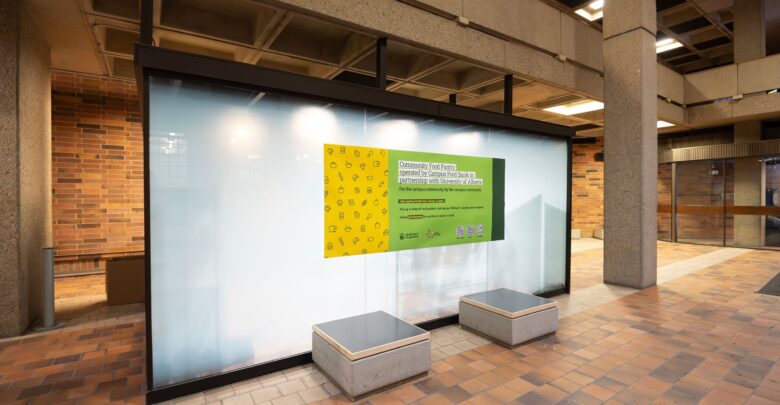CFB struggling to keep community pantry stocked due to lack of donations
“We’re hearing a lot of scary stories from students who are going way too long without feeding themselves properly," Executive Director Erin O'Neil says.
 Supplied
SuppliedTo address increased demand for its services, on January 22, the Campus Food Bank (CFB) opened up a community pantry in the Rutherford Atrium. Now, the CFB is finding that demand for the pantry is outstripping the donations, leaving the pantry almost empty some days, according to Executive Director Erin O’Neil.
“The pantry came along as an idea because we wanted to have another option for folks to access food. Our waitlist right now is at about six weeks, so we wanted something more quickly responsive for people,” O’Neil said.
To stock the pantry, the CFB created the Adopt a Week program. By volunteering for the program, campus offices, student clubs, community organizations, and local businesses would agree to stock the community pantry for one week. O’Neil said when creating the program, they estimated the cost to stock the pantry would be $1,500.
While many different groups signed up to stock the pantry in the winter semester, O’Neil said no groups have adopted a week for the spring or summer semesters.
“Campus empties out a little bit but there’s still lots of folks around. So we’re a little concerned that the pantry will be pretty much empty,” O’Neil said.
“We really need the community to show up for this. We’re hearing a lot of scary stories from students who are going way too long without feeding themselves properly.”
Community pantry has seen “a number of weeks where it’s been pretty much empty”
CFB volunteers check on the community pantry daily and report back to O’Neil on the stock. According to O’Neil, there’s been “a number of weeks where it’s been pretty much empty.” Volunteers reported seeing people come in and ultimately be disappointed by the lack of food, O’Neil said.
O’Neil said this indicates the community pantry is not meeting demand. Over the past two years, the CFB has seen significant growth, O’Neil said. In 2021-22, the CFB saw 2,500 store visits. For 2023-24, O’Neil said the CFB expects to see over 10,000 store visits.
“While the pantry has a lot of potential to meet a gap in service that our limitations have created, we just really need the community to adopt it as their own,” O’Neil said.
O’Neil addresses “myth around stealing,” says ’it’s just a lot of people”
Over the last few years, O’Neil said the CFB has worked to address myths around food bank usage. One myth relevant to the community pantry is the myth around stealing, she said.
“The stealing one is a very difficult one to address. When you’re leveraging limited resources, people get possessive and worry about the what-ifs. In the case of the pantry, it makes sense to worry that if someone comes in and takes all the food, that means that other people won’t be able to benefit from it.”
The reality for the people who use the community pantry is that they’re hungry, O’Neil said. Although the pantry has signs stating the maximum food allowance, the CFB does not monitor the pantry.
“What we’re really focused on is the fact that people in our community are hungry enough that they are willing to possibly break a rule that’s been stated, like a maximum food allowance. That risk is worth it to them because of where they’re at in their life.”
While Adopt a Week groups set out to stock the pantry for an entire week, O’Neil said groups have found the pantry empty after a few hours. Some groups decided to monitor the pantry.
“[They] have seen and reported back to us that it actually is just people taking a few items. It’s just a lot of people.”
O’Neil encourages “everybody who has the capacity on campus to bring food to the pantry whenever they can”
Since the community pantry only opened up in January, O’Neil said they’re giving themselves a “year-long runway.” During this time, the CFB is hoping to gain an understanding of which weeks don’t get adopted and tactics to deal with that.
“We really just want to encourage everybody who has the capacity on campus to bring food to the pantry whenever they can.”
The CFB is specifically hoping faculty, staff, and alumni will take up donating to the pantry “to directly help students who are currently facing some of the worst cost-of-living increases in Edmonton.”
“I would say it is becoming increasingly untenable to afford student life. I think we should do everything we can to show up.”




